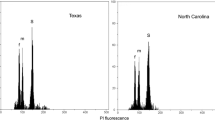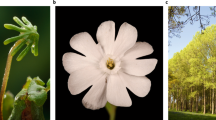Abstract
MANY cases are known in which the results of reciprocal crosses between green and variegated plants fail to agree. In all these cases the progeny reproduce the appearance of the female parent alone. Cases are also known in which a cross made one way between two true breeding green races results in variegation, whereas in the reciprocal cross the appearance of variegation is either deferred to a later generation or is absent. We know that the female contributes all, or the greater part, of the cytoplasm, and it has therefore been supposed that the cytoplasm, or its inclusions, is partly or wholly responsible for this difference in inheritance. Can this difference in the contribution of the male and female account for the dissimilar results of reciprocal crosses in other characters than variegation?
This is a preview of subscription content, access via your institution
Access options
Subscribe to this journal
Receive 51 print issues and online access
$199.00 per year
only $3.90 per issue
Buy this article
- Purchase on Springer Link
- Instant access to full article PDF
Prices may be subject to local taxes which are calculated during checkout
Similar content being viewed by others
Author information
Authors and Affiliations
Rights and permissions
About this article
Cite this article
CHITTENDEN, R., PELLEW, C. A Suggested Interpretation of Certain Cases of Anisogeny. Nature 119, 10–11 (1927). https://doi.org/10.1038/119010a0
Issue Date:
DOI: https://doi.org/10.1038/119010a0
This article is cited by
-
Changes in sex in the flowers of the hybridSolanum rybinii × S. chacoense
Genetica (1953)
-
Neue �berlegungen zum Problem der Ausserkaryotischen Vererbung
Zeitschrift f�r Induktive Abstammungs- und Vererbungslehre (1952)
-
Plasmonbegriff und Störungssysteme in der GattungEpilobium
Der Züchter (1950)
-
Nuclear and cytoplasmic inheritance of resistance to infection by nodule bacteria in red clover
Heredity (1949)
-
Die genetische und entwicklungsphysiologische Bedeutung des Cytoplasmas
Zeitschrift für Induktive Abstammungs- und Vererbungslehre (1937)
Comments
By submitting a comment you agree to abide by our Terms and Community Guidelines. If you find something abusive or that does not comply with our terms or guidelines please flag it as inappropriate.



